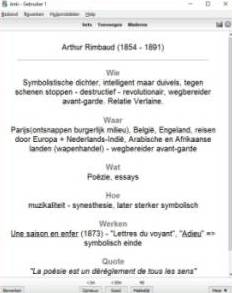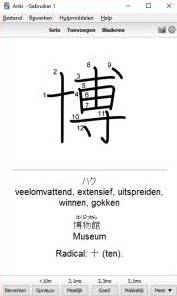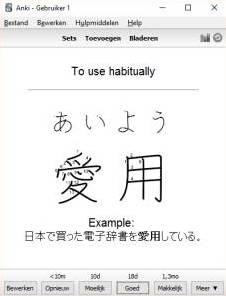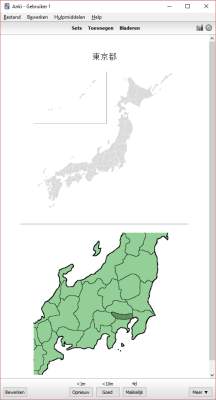This page contains links and files that have proven to be particularly useful for myself and might be of use for those with similar interests. I’ll update this spot as I encounter more tools or pages I feel are worthy of mention.
Useful Links
General
- Anki: Free, open-source, multi-platform flashcard application with powerful SRS2 algorithm. Especially vital for language acquisition and probably the single most important (digital) tool for efficient memorization.
Language
Japanese
- Yomichan: a Firefox and Chrome pop-up dictionary and a digital-minded Japanese learner’s best friend. Yomichan allows additional audio playback and full Anki integration. I’ve written a blog on how to do this. Rikaisama, although no longer by Firefox, also continues to be useful for mass-generating cards while reading HTML-formatted e-books.
- Animelon: for all you ‘learn Japanese through Anime’ kids out there! Reminiscent of the classic Erin’s Challenge videos: watch various popular anime with Japanese subtitles and integrated dictionary. Works in combination with Yomichan or Rikaisama as well.
- Tangorin: my favorite online Japanese dictionary with tons of example sentences for each definition, and an excellent Kanji dictionary as well. Goo, Weblio and Sanseido provide good alternatives.
- Waran Jiten: a Japanese-Dutch dictionary courtesy of Leuven University. Has a dutch Rikai addon.
- Sourceforge: contains a wide variety of software developed by fellow Japanese learners. Some, such as Jnovelformatter, Japanese Text Analysis Tool or OCR Manga Reader are particularly noteworthy, others not so much.
- KULeuven Japanology: the Leuven University Japan Studies homepage.
Korean
- Toktogi: a Korean-English pop-up dictionary similar to yomichan, available both for Firefox and Chrome. It’s still a work-in-progress and not as polished as Yomichan, but very usable nonetheless.
- Naver Dictionary: Naver Corporation, the highly popular South Korean web-hub, has a fairly complete English-Korean dictionary as well as an Android application (requires internet).
Sanskrit
- spokensanskrit: the only decent online Sanskrit dictionary out there.
- Lexilogos: multilingual web keyboard that beats learning to type devanagari on a latin-script keyboard.
Files
Anki
I use Anki to complement my other study methods for nearly all my classes. These are a bunch of Anki-sets I made I feel are stand-alone enough to be useful to new students of these classes as well.
Inleiding tot de Europese Literatuur na 1750
- Download: Europese Literatuur (±26MB)
A full set to accompany the textbook ‘Literaire Verbeelding 2’:3 contains important dates and summaries of all artists and their discussed works (in Dutch), sorted by period (from Romanticism till Post-modernism).

Kanji 1 & Kanji 2
- Download: Kanji 1 Kanji Vocab 1 (±9MB each)
Two sets on the compulsory Kanji and vocabulary as seen in the Kanji classes in the first year of Japan Studies at KU Leuven. They contain stroke order, definitions, and different readings, both in recognition and reproduction form. They use the KanjiStrokeOrders4 font and display hidden hiragana on touch/hover. I recommend doing these on a hand-held device to practice writing and stroke order using the touchscreen.
- Download: Kanji 2 Kanji Vocab 2 (±10MB each)
Similar to the previous decks, two sets on the compulsory kanji and vocabulary for Kanji/goi classes in the second year of Japanese Studies, as seen in our handbook5 lessons 1 - 20. They’re tagged by chapter and contain respectively stroke order, radicals, definitions, and different readings for the Kanji set, and example sentences in cloze deletion6 for vocab, both in recognition and reproduction form.


Japanese Geography
- Download: Japanese Geography (±10MB)
A modified Prefectures in Japan set, includes all Japanese regions and prefectures written in Kanji with furigana, and some extra maps.

Sanskrit
- Download: Europese Literatuur (±5MB)
A full set to accompany the introductory Sanskrit language course. Includes an introduction to the Devanagari alphabet, a recap of the taught grammar points (such as different conjugations and Sandi rules), three-way cards (English/Sanskrit, Sanskrit/English and audio) of all the vocabulary as seen in class and several exercises.
Anki Plug-in: Japanese Definitions for Korean Vocabulary
An Anki add-on, based on the Sanseido Definitions add-on, for adding Japanese translations of Korean vocabulary. It’s primarily meant for Korean learners who’re proficient in, or simultaneously learning, Japanese. I wrote a small tutorial for those new to Anki plug-ins.
Anki Plug-in: Remove Missing Audio References
- Download: Remove Missing Audio References
An Anki plug-in to be used in combination with a Rikaisama / Anki set-up as prescribed in this blog. Replaces or removes references to missing audio-files.
-
Image taken from the 2012 Japanese animated film Wolf Children by Mamoru Hosoda, used under Fair Use doctrine. ↩
-
Spaced Repetition System: a method of studying optimally by repeating items over gradually increasing periods. Cards are calculated to appear shortly before the item slips one’s mind. ↩
-
Ghesquiere, R. 2006. Literaire verbeelding 2: een geschiedenis van de Europese literatuur en cultuur vanaf 1750. Leuven: Acco ↩
-
Available for free under a BSD style license at http://www.nihilist.org.uk/. ↩
-
Japanese for International/Graduate Students vol.5: Kanji and Vocabulary(稲村真理子. 2007. 大学・大学院留学生の日本語. 5(漢字・語彙編) 5(漢字・語彙編). 東京: アルク) ↩
-
cloze deletion test: an exercise in which one fills in portions of the text left blank, based on the context of the text. ↩
